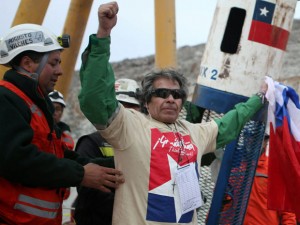Insights from the Chilean mine rescue, September 11th and the global economic downturn.
The Mine Rescue
I am sure that many of you were similarly glued to your TV or computers watching the live feed of the remarkable Chilean miner rescue last month. There were many unforgettable images that galvanized a country and millions of others throughout the world.
 A friend commented at the time that this could help bring more peace and optimism in the world. I nodded in agreement and afterwards sat and wondered. I came to the unfortunate conclusion that as a society we have a very short term memory and attention span. It takes a lot for change to stick.
A friend commented at the time that this could help bring more peace and optimism in the world. I nodded in agreement and afterwards sat and wondered. I came to the unfortunate conclusion that as a society we have a very short term memory and attention span. It takes a lot for change to stick.
Not sure I am alone in this but after only a day or so after the rescue, the galvanizing unforgettable images had already begun to fade. I know this won’t be the case for those more directly impacted, but it was the case for me. Writing deadlines, my sore back, and a myriad of priorities and activities have begun to take over my field of vision, emotions, time and energy.
September 11th
I was struck by a similar pattern during the events of and following September 11th.
After the towers came down in September 2001, there was a powerful collective outpouring of genuine care. People who were complete strangers to one another voluntarily shared the intimate details of their lives, including their fears and hopes for the future. In the weeks and months following the events of 9/11, looking someone in the eye and wishing them a safe flight took on new and powerful meaning.
But as time continued to pass, so did this temporary norm of acceptable, intimate interactions with others. Most of us eventually went back to our usual routines, focusing on our immediate and personal network of relationships at home, work, and in local communities. Yet some of us were so profoundly changed by this time that an entirely new set of priorities emerged and continued.
Do we choose and therefore permit ourselves to be opened and shaped by life’s experiences? If so, to what extent and for how long? Do we personally decide whether we will change back into our habitual states of consciousness, the who and what we’ve always experienced ourselves to be?
The Economic Downturn
How about the impact of the global economic downturn on our long term behavior? Might something different be happening here. Will we go back to our old ways of spending and living beyond our means or embrace a simpler and more balanced life?
What brings me hope is the duration of the recession and the opportunity for people to slowly embrace a “new normal” view of consumerism and priorities. We have been living with the recession for the better part of 2 years and will likely feel its effects for years to come.
I’m a firm believer that we need crisis in our lives to change. Also believe that short term crisis yields short term changes. What the downturn has going for it is its duration.
My upside view and sincere hope is that many will continue to embrace long-term, sustainable life style and consumer behavior changes which will be both good for us individually as well as for our planet.
Questions:
What do you believe will be happening with future spending habits and behavior?
What do you believe is needed for change to stick?
We look forward to your comments…
Photo Credit
“Oldest Chilean miner rescued – San Jose mine, near Copiapo, Chile” Photo by Juan Mabromata, AFP


Here are a few things that I anticipate being a part of the future of middle class American families. I think we will see multiple generations living under one roof. I suspect that many of today’s teens will forego heading off to a university after high school graduation. They will remain living under their parent’s roof, and will attend a community college for two years before becoming commuters to the university. Then, they’ll graduate and still remain at home while paying off student loans and earning just enough money to pay for gas, insurance, and chipping in for the family’s household expenses. Initially, I thought it sad for this next generation, but now I’m seeing it differently. I’m hoping it will strengthen the bonds between families as we let go of our rugged independence.
These are good questions Steve. I don’t pretend to have answers. I noticed, as well, that immediately after 9/11 there were many editorial / blog proclamations that ‘this changes (whatever) forever.’ For example: were were told there would be no more Hollywood movies about terrorists blowing things up. This was now too serious and movies were frivolous. True, the blow-em-up movies faded – for about 9 months, as I recall. Now there are more of them than ever.
Similarly, the last time that gas prices spiked (was that in 07?), people were running for hybrids and downsizing their big rigs. But the logic of doing so didn’t stick – as soon as gas was cheap again, consumption jumped back up.
I do believe that societal change (and most personal change) is incremental – small adjustments that accumulate.
Interesting comments Lorne. Agree with your incremental idea… I am very interested in see what happens to our consumption habits over time. We are told consumer confidence fuels an economy; at the same time how do we avoid a repeat of the unsustainable habits that got us into the mess in the first place…….